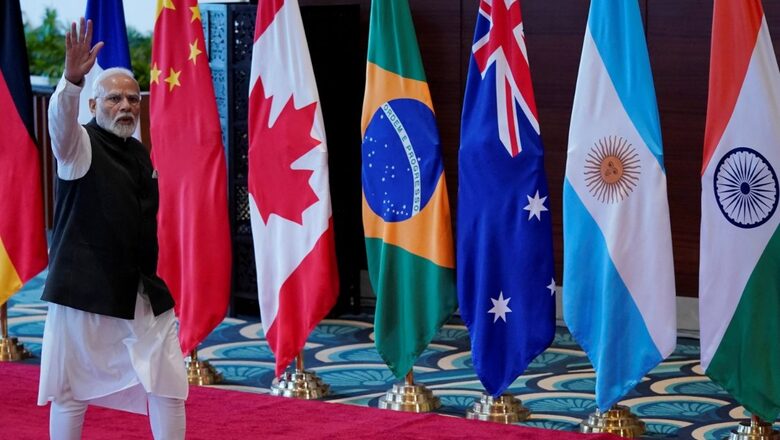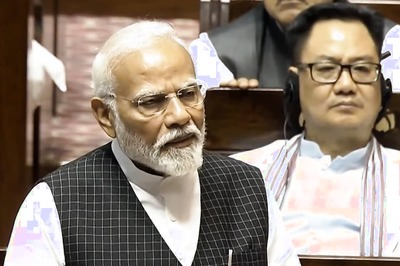
views
Prime Minister Narendra Modi is headed to Dubai to attend the Conference of Parties to the UN Framework Convention on Climate Change (COP28). This will be the second climate change summit that PM Modi will attend in three years, with the last visit for the COP26 Summit being made to Glasgow in 2021. Back then, India had made some big-ticket announcements, like the country’s plan to attain net-zero status by 2070. PM Modi had also unveiled India’s five-pronged ‘Panchamrit’ strategy to deal with climate change. Now, the visit to Dubai, coming on the back of a highly successful Indian presidency of G20, speaks to the importance India attaches to climate change and the need for collective international action towards combatting it.
The main agenda is to complete a stocktaking exercise to review the progress in the global fight against climate change and decide on measures to strengthen climate actions being taken by countries. In particular, the focus will be on the performance of countries toward the Paris Agreement, especially the goal of capping the global temperature increase below 2 degrees Celsius. Importantly, India has been at the forefront of pushing for all countries’ performance to be assessed.
India will be participating in the COP28 Summit as a leading nation when it comes to climate action. After all, where the richest and most developed nations of the world have fallen abysmally short, a developing nation like India has begun shining. According to a report by the Climate Vulnerable Forum (CVF), India, Indonesia, the UK and Switzerland alone are among the major economies currently on track to meet Paris Agreement goals based on their pledged targets for 2030.
Late last year, India was ranked among the top five countries and the best among the G20 nations under the global Climate Change Performance Index (CCPI). India secured the 8th position on the index, which was two positions up from the previous edition.
India is also the only G20 country to figure among the top 10 nations on the index. This assessment was mirrored by renowned think tank, Observer Research Foundation earlier this year. ORF found that India is leading in climate performance or efforts to mitigate climate crisis among G20 nations, as it beat countries like the UK and Germany too.
India is well poised to not only achieve its ambitious target of having a renewable energy capacity of 500 gigawatts but also surpass it by 2030. Among the most important climate outcomes of India’s G20 presidency was the commitment of nations to triple their renewable energy capacities by 2030. According to the International Energy Agency, this single measure could result in the prevention of seven billion tonnes of carbon dioxide emissions by 2030.
So, India is approaching COP28 from a position of tremendous strength. This is why the United Nations Development Programme has said that India is expected to push for a “big change” in the global strategy to tackle climate change. In a sign that India’s views are being paid heed to, the COP28 Summit will also feature a health ministerial meet, likely to be attended by ministers from 65 countries. This will be in line with the Lifestyle for Environment (LiFE) movement launched by PM Modi – one which is now serving as the bedrock of India’s climate action. Simultaneously, India will pitch its Global Biofuel Alliance (GBA) to a large group of developing nations. This will further solidify India’s position as a leader and voice of the Global South.
By Asking Developed World to ‘Do More’, India Demonstrates Appetite to Call Spade a Spade
Being a leading performer in achieving its climate targets accords India certain privileges. For starters, India now has the right to call out nations that are either non-committal towards a global climate action plan, or those who are abdicating their responsibilities despite wanting to appear as flag-bearers of the fight against climate change.
Union Finance Minister Nirmala Sitharaman’s remarks in Dubai demonstrate India’s willingness to call a spade a spade and demand accountability from the richest nations of the planet. Sitharaman called for concrete action on climate funding and transfer of technology at the upcoming global climate summit. She said, “India will certainly be pushing forward to showcase what it has achieved with its own funds. The Paris commitment given by us has been funded by us. We didn’t wait for the hundred billion that is never on the table. A lot of talk, but no money coming on the table; no pathways to show how technology is going to be transferred.”
PM Modi echoed a similar sentiment in August this year, when he wrote in a column, “Many countries of the Global South are at various stages of development and climate action must be a complementary pursuit. Ambitions for climate action must be matched with actions on climate finance and transfer of technology.” The message was clear. Developed countries cannot have it both ways.
In fact, in September, India had hit out at the developed world hard. In a submission to the UN Framework Convention on Climate Change (UNFCCC), India said some developed countries are ignoring some provisions in the Paris Agreement relating to climate finance in an attempt to move away from their commitments to provide money to developing countries. India also said that rich nations are continuing to invest in fossil fuels which is unfair.
It is evident that as a voice of the Global South, India continues to highlight the challenges faced by underdeveloped and developing nations to make meaningful progress with regard to climate action, while developed nations abdicate their responsibilities.
The last climate summit PM Modi attended was in Glasgow, and he made some big promises there. As the Prime Minister embarks on his visit to the United Arab Emirates to attend COP28, it is likely that more ambitious plans will be spelt out that strengthen India’s position as a leading power combatting climate change.
Views expressed in the above piece are personal and solely that of the author. They do not necessarily reflect News18’s views.



















Comments
0 comment